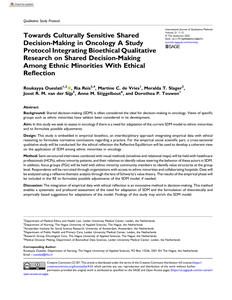Oncology healthcare professionals (HCPs) and cancer patients often have difficulties in navigating conversations about sexual changes and concerns due to cancer and its treatments. The present study draws on Discursive Psychology to analyze how the topic of sexuality is raised and managed in Dutch oncological consultations. Our corpus consists of 28 audio recordings. We analyzed the discursive practices used by cancer patients and oncology HCPs and to what effect. Patients, on the one hand, employ vagueness, pronouns, and ellipses, while HCPs attribute talk to others and use generalizations, and speech perturbations. Through these practices they collectively keep the topic of sexuality at a distance, thereby constructing it as a delicate topic. Moreover, we explicate the norms related to sexual behavior that cancer patients and oncology HCPs orient to in their talk. Finally, we address ways in which oncology HCPs can open the door on discussing sexual changes with their patients.
MULTIFILE

Background: Shared decision-making (SDM) is often considered the ideal for decision-making in oncology. Views of specific groups such as ethnic minorities have seldom been considered in its development. Aim: In this study we seek to assess in oncology if there is a need for adaptation of the current SDM model to ethnic minorities and to formulate possible adjustments. Design: This study is embedded in empirical bioethics, an interdisciplinary approach integrating empirical data with ethical reasoning to formulate normative conclusions regarding a practice. For the empirical social scientific part, a cross-sectional qualitative study will be conducted; for the ethical reflection the Reflective Equilibrium will be used to develop a coherent view on the application of SDM among ethnic minorities in oncology. Method: Semi-structured interviews combined with visual methods (timelines and relational maps) will be held with healthcare professionals (HCPs), ethnic minority patients, and their relatives to identify values steering the behavior of these actors in SDM. In addition, focus groups (FGs) will be held with ethnic minority community members to identify value structures at the group level. Respondents will be recruited through organizations with access to ethnic minorities and collaborating hospitals. Data will be analyzed using a reflexive thematic analysis through the lens of Schwartz’s value theory. The results of the empirical phase will be included in the RE to formulate possible adjustments of the SDM model, if needed. Discussion: The integration of empirical data with ethical reflection is an innovative method in decision-making. This method enables a systematic and profound assessment of the need for adaptation of SDM and the formulation of theoretically and empirically based suggestions for adaptations of the model. Findings of this study may enrich the SDM model.
DOCUMENT

Background: There is a lack of evidence regarding the relationship between family involvement and outcomes in gastrointestinal oncology patients after surgery. To evaluate the effect of a family involvement program for patients undergoing oncologic gastrointestinal surgery on unplanned readmissions within 30 days after surgery. Methods: A multicenter patient-preference cohort study compared 2 groups: patients who participated in the family involvement program versus usual care. The program comprised involvement of family caregivers in care and training of health care professionals in family-centered care. Multivariable regression analyses were used to evaluate the effect of the FIP on the number of unplanned readmissions up to 30 days after surgery. Secondary outcomes included complications sensitive to fundamental care activities, emergency department visits, intensive care unit admissions, hospital length of stay, and the need for professional home care after discharge. Results: Of the 301 patients included, 152 chose the family involvement program, and 149 chose usual care. Postoperative readmissions occurred in 25 (16.4%) patients in the family involvement program group, and 15 (10.1%) in the usual care group (P = .11). A significant reduction of 16.2% was observed in the need for professional home care after discharge in the family involvement program group (P < .01). No significant differences were found between the 2 groups in the other secondary outcomes. Conclusion: The family involvement program did not reduce the number of unplanned readmissions, but it led to a substantial reduction in-home care, which suggests an economic benefit from a societal perspective. Implementation of the family involvement program should, therefore, be considered in clinical practice.
MULTIFILE
